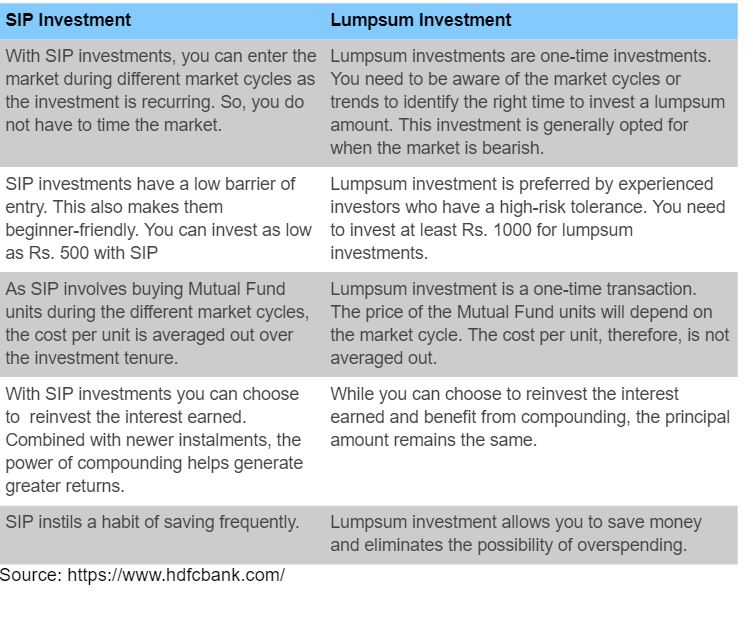SIP or lump sum investments in mutual funds come in handy in different situations.
Investing money and earning profit over it is a task which revolves around how one takes a decision. Right from understanding the basics of the product/policy to choosing or availability of the budget become crucial. Even the methods of payment play a crucial role in your financial planning.
Systematic investment plan (SIP) is one such method which has gained popularity among the investors, especially young first-time retail investors, who want to secure their retirement or have goals like owning a house or higher education.
Not just SIPs, another common method is ‘lump sum’. Mutual fund investors do encounter this choice-cum-confusion when they initiate an investment plan.
Both the methods are useful in different situations for investors. Factors like the type of fund, amount to be invested, prevailing market situation can determine your approach to how you put the money.
SIP or lump sum investments in mutual funds come in handy in different situations. In short, depending on your pocket, choose to invest through a SIP or a lump sum.
What is the difference between SIP and lump sum?
Lump sum is a one-time investment by a fund buyer, when there is a substantial disposable amount in hand.
A lump sum investment is of the entire amount at one go. For example when one receives a windfall in the form of bonus, leave encashment or otherwise.
In SIP, you can invest in mutual funds in a staggered manner where you invest a small amount regularly, say monthly as low as Rs 500. SIP has been gaining popularity among Indian investors, as it helps in ‘Rupee Cost Averaging’ and also in investing in a disciplined manner without worrying about market volatility and timing the market.
Also Read– Online Medical Certificate Made Mandatory For Renewal Of Driving License In THIS State From Jan 26
Rahul Jain, president and head, Nuvama Wealth, said, “SIP is a convenient and effective investment method to create wealth using equity funds. On a given date, money is automatically invested into a fund without human intervention, thus eliminating the ‘noise’ and role of fear in investments, the biggest impediment to wealth creation.”
However, selecting an investment avenue must depend on your short-term and long-term goals. One must consider crucial factors such as monthly income, financial stability, investment goals and risk-appetite before opting for any mutual fund.

It must be noted that the returns generated from the investment, whether through lump sum or SIP, depend on the market conditions. If the markets are rallying, a lump sum investment could prove more profitable, with the advantage of compounding. On the other hand, if the trend is bearish or volatile, SIPs with their rupee-cost averaging can be more beneficial.
However, investors must understand that markets are unpredictable, nobody can say when it is going up or down or when a bullish or bearish cycle will begin or end.
Also Read– 5 Effective Ways To Save More On Income Tax
It cannot be said that lump sum investment can potentially generate higher returns than SIP or vice versa. Therefore, it is important to build a well-diversified portfolio that aligns with your goals and risk appetite.
Rise of SIPs
SIPs have seen a growth in terms of their acceptance as a tool to create wealth in the long run.
“Left on their own, investors try to time the market to perfection, thus missing out on investment opportunities. Investors should plan long-term goals with SIPs and continue till the goal is met,” Jain said.
According to the Association of Mutual Funds in India, as of December 2022, mutual fund SIP accounts stood at 6.12 crore and the total amount collected through SIP during December 2022 was Rs 13,573 crore.
The current run rate of inflows is expected to continue in 2023 with experts suggesting monthly SIPs touching around Rs 14,000 crore on an average.
Also Read– 5 Effective Ways To Save More On Income Tax
Investors must note that mutual funds are subject to market risk and they are advised to read all scheme related documents carefully before investing.





































